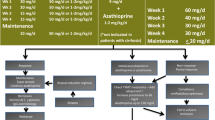Abstract
Autoimmune hepatitis (AIH) is an autoreactive chronic inflammatory liver disease that can affect individuals of any age. In the elderly, AIH may present as acute or chronic hepatitis with elevated liver enzyme levels. As elderly patients have increased risk of developing corticosteroid-related complications, induction therapy with low-dose prednisone (or equivalent) + azathioprine or budesonide + azathioprine is preferred over high-dose corticosteroid monotherapy. Maintenance treatment, preferably with azathioprine monotherapy, should be continued until full biochemical and histological remission is achieved.

Similar content being viewed by others
References
Rizvi S, Gawrieh S. Autoimmune hepatitis in the elderly: diagnosis and pharmacologic management. Drugs Aging. 2018;35(7):589–602.
Al-Chalabi T, Boccato S, Portmann BC, et al. Autoimmune hepatitis (AIH) in the elderly: a systematic retrospective analysis of a large group of consecutive patients with definite AIH followed at a tertiary referral centre. J Hepatol. 2006;45(4):575–83.
Verslype C, George C, Buchel E, et al. Diagnosis and treatment of autoimmune hepatitis at age 65 and older. Aliment Pharmacol Ther. 2005;21(6):695–9.
Chen J, Eslick GD, Weltman M. Systematic review with meta-analysis: clinical manifestations and management of autoimmune hepatitis in the elderly. Aliment Pharmacol Ther. 2014;39(2):117–24.
Czaja AJ. Clinical features, differential diagnosis and treatment of autoimmune hepatitis in the elderly. Drugs Aging. 2008;25(3):219–39.
Mishima S, Omagari K, Ohba K, et al. Clinical implications of antimitochondrial antibodies in type 1 autoimmune hepatitis: a longitudinal study. Hepatogastroenterology. 2008;55(81):221–7.
Czaja AJ. Drug-induced autoimmune-like hepatitis. Dig Dis Sci. 2011;56(4):958–76.
Manns MP, Czaja AJ, Gorham JD, et al. Diagnosis and management of autoimmune hepatitis. Hepatology. 2010;51(6):2193–213.
Feld JJ, Dinh H, Arenovich T, et al. Autoimmune hepatitis: effect of symptoms and cirrhosis on natural history and outcome. Hepatology. 2005;42(1):53–62.
Czaja AJ, Rakela J, Ludwig J. Features reflective of early prognosis in corticosteroid-treated severe autoimmune chronic active hepatitis. Gastroenterology. 1988;95(2):448–53.
Vierling JM. Autoimmune hepatitis and overlap syndromes: diagnosis and management. Clin Gastroenterol Hepatol. 2015;13(2):2088–108.
Lamers MM, van Oijen MG, Pronk M, et al. Treatment options for autoimmune hepatitis: a systematic review of randomized controlled trials. J Hepatol. 2010;53(1):191–8.
Czaja AJ, Carpenter HA. Distinctive clinical phenotype and treatment outcome of type 1 autoimmune hepatitis in the elderly. Hepatology. 2006;43(3):532–8.
Czaja AJ, Carpenter HA. Decreased fibrosis during corticosteroid therapy of autoimmune hepatitis. J Hepatol. 2004;40(4):646–52.
Wang KK, Czaja AJ. Prognosis of corticosteroid-treated hepatitis B surface antigen-negative chronic active hepatitis in postmenopausal women: a retrospective analysis. Gastroenterology. 1989;97(5):1288–93.
Yeoman AD, Longhi MS, Heneghan MA. Review article: the modern management of autoimmune hepatitis. Aliment Pharmacol Ther. 2010;31(8):771–87.
Wang KK, Czaja AJ, Beaver SJ, et al. Extrahepatic malignancy following long-term immunosuppressive therapy of severe hepatitis B surface antigen-negative chronic active hepatitis. Hepatology. 1989;10(1):39–43.
Czaja AJ, Carpenter HA. Thiopurine methyltransferase deficiency and azathioprine intolerance in autoimmune hepatitis. Dig Dis Sci. 2006;51(5):968–75.
Johnson PJ, McFarlane IG, Williams R. Azathioprine for long-term maintenance of remission in autoimmune hepatitis. N Engl J Med. 1995;333(15):958–63.
Manns MP, Woynarowski M, Kreisel W, et al. Budesonide induces remission more effectively than prednisone in a controlled trial of patients with autoimmune hepatitis. Gastroenterology. 2010;139(4):1198–206.
Peiseler M, Liebscher T, Sebode M, et al. Efficacy and limitations of budesonide as a second-line treatment for patients with autoimmune hepatitis. Clin Gastroenterol Hepatol. 2018;16(2):pp. 260–7 e1.
de Boer YS, van Gerven NM, de Boer NK, et al. Allopurinol safely and effectively optimises thiopurine metabolites in patients with autoimmune hepatitis. Aliment Pharmacol Ther. 2013;37(6):640–6.
Efe C, Hagstrom H, Ytting H, et al. Efficacy and safety of mycophenolate mofetil and tacrolimus as second-line therapy for patients with autoimmune hepatitis. Clin Gastroenterol H. 2017;15(12):1950–6.
Schramm C, Bubenheim M, Adam R, et al. Primary liver transplantation for autoimmune hepatitis: a comparative analysis of the European Liver Transplant Registry. Liver Transpl. 2010;16(4):461–9.
Author information
Authors and Affiliations
Consortia
Ethics declarations
Conflict of interest
The article was adapted from Drugs & Aging 2018;35(7):589–602 [1] by employees of Adis/Springer, who are responsible for the article content and declare no conflicts of interest.
Funding
The preparation of this review was not supported by any external funding.
Rights and permissions
About this article
Cite this article
Adis Medical Writers. Treat autoimmune hepatitis in the elderly with corticosteroids + azathioprine to reduce the risk of corticosteroid-related toxicity. Drugs Ther Perspect 35, 129–134 (2019). https://doi.org/10.1007/s40267-018-0585-0
Published:
Issue Date:
DOI: https://doi.org/10.1007/s40267-018-0585-0



